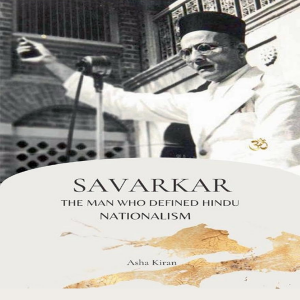

Savarkar
Asha Kiran
This audiobook is narrated by a digital voice.
Vinayak Damodar Savarkar, byname Vir or Veer, (born May 28, 1883, Bhagur, India-died Feb. 26, 1966, Bombay [now Mumbai]), Hindu and Indian nationalist and leading figure in the Hindu Mahasabha ("Great Society of Hindus"), a Hindu nationalist organization and political party. Savarkar's political philosophy was quite unique as it had elements of various ethical, theological, and philosophical theories. In other words, his political philosophy was basically a mixture of humanism, rationalism, universalism, positivism, utilitarianism, and realism. He also acted against some of India's social evils, such as caste discrimination and untouchability that were prevalent during his time. Just before his death, Vinayak Damodar Savarkar wrote an article called 'Atmahatya Nahi Atmaarpan.' The article gave an insight on fast until death (atmaarpan) and stated that one should be allowed to end his or her life when one's main objective of life is achieved. On February 1, 1966, Savarkar declared that he would observe fast until death and refused to eat. On February 26, 1966, he breathed his last at his Bombay residence. His home and other possessions are now preserved for public display.
Duration - 6h 39m.
Author - Asha Kiran.
Narrator - Digital Voice Madison G.
Published Date - Saturday, 25 January 2025.
Copyright - © 2024 pankaj gupta ©.
Location:
United States
Description:
This audiobook is narrated by a digital voice. Vinayak Damodar Savarkar, byname Vir or Veer, (born May 28, 1883, Bhagur, India-died Feb. 26, 1966, Bombay [now Mumbai]), Hindu and Indian nationalist and leading figure in the Hindu Mahasabha ("Great Society of Hindus"), a Hindu nationalist organization and political party. Savarkar's political philosophy was quite unique as it had elements of various ethical, theological, and philosophical theories. In other words, his political philosophy was basically a mixture of humanism, rationalism, universalism, positivism, utilitarianism, and realism. He also acted against some of India's social evils, such as caste discrimination and untouchability that were prevalent during his time. Just before his death, Vinayak Damodar Savarkar wrote an article called 'Atmahatya Nahi Atmaarpan.' The article gave an insight on fast until death (atmaarpan) and stated that one should be allowed to end his or her life when one's main objective of life is achieved. On February 1, 1966, Savarkar declared that he would observe fast until death and refused to eat. On February 26, 1966, he breathed his last at his Bombay residence. His home and other possessions are now preserved for public display. Duration - 6h 39m. Author - Asha Kiran. Narrator - Digital Voice Madison G. Published Date - Saturday, 25 January 2025. Copyright - © 2024 pankaj gupta ©.
Language:
English
1 | Biography
Duration:00:02:22
Early Life
Duration:00:12:13
Hindutva
Duration:00:06:53
Works
Duration:00:02:06
Savarkar in London
Duration:00:05:55
Partition and Gandhi's Murder
Duration:00:03:08
Some Interesting Facts about Savarkar
Duration:00:16:28
Later Life
Duration:00:01:50
2 | Life and Work of Savarkar | His Struggle for Freedom
Duration:00:07:33
His Literature
Duration:00:20:13
Religious Discriptures
Duration:00:06:49
Social Reform-political Freedom
Duration:00:24:33
The Example of 1857
Duration:00:04:17
India Office Library and Records
Duration:00:29:52
3 | Leader of the Hindu Mahasabha
Duration:00:03:55
Hindus: All One and a Nation
Duration:00:43:51
Revolutionary Activities
Duration:00:10:15
4 | Remembering Veer Savarkar
Duration:00:00:51
Born Leader
Duration:00:06:58
Talented Mr. Savarkar
Duration:00:03:37
Attacks Gandhi and Jinnah
Duration:00:07:08
Cripps Mission
Duration:00:03:40
Old Age
Duration:00:08:37
5 | Ideologue of Hindutva
Duration:00:09:38
Associates in Hindutva Movement
Duration:00:19:45
Essential Implications of Hindutva
Duration:00:31:28
Savarkar and the Presentation of Hindutva
Duration:00:18:25
Nathuram Godse, the RSS, and the Murder of Gandhi
Duration:00:05:55
Hindutva is Different from Hinduism
Duration:00:22:32
6 | Swadharma and Swaraj
Duration:00:22:55
Social Revolution
Duration:00:09:13
Founding of the Indian Home Rule Society
Duration:00:10:46
7 | Associates in Social Reforms
Duration:00:10:02
Rationalism
Duration:00:00:41
Ethics-truth-nonviolence
Duration:00:05:18